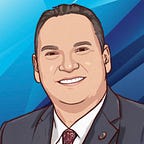EHRs Must Be Comprehensive, Patient-Driven and Multi-generational
The ability of our direct descendants to have access to our electronic health records (EHR) and health data is fundamental
In my previous post I stated that: “Our health data in the future will be treated like money. It is a personal, valuable, yet accessible asset that is held in a secure wallet, for immediate use, anywhere, anytime”. But for health data to be truly an asset it should also maintain a probable future benefit.
Therefore data must be not only adequately stored and protected, but also be shared when permitted and allowed to be inherited or donated after we die
1. EHRs must be comprehensive and patient-driven
The Office of the National Coordinator for Health IT (ONC) certifies basic EHRs that record patient demographics, computerize prescription order entries (CPOE), view laboratory and imaging results and document clinical notes, patient medications, allergies and problem lists.
EHRs then need to follow Centers for Medicare & Medicaid Services (CMS) meaningful use rules and demonstrate improved quality, safety, efficiency and coordination of care, while ensuring adequate privacy and security of personal health information. (Meaningful Use for 2019 here).
However for an EHR to be comprehensive it needs also to capture most if not all, sentinel medical, social and environmental determinants of health and translate it to actionable information (see MyHealthEVet or MyHealthEData).
With recent advances in wearable, wireless and mobile technologies EHRs now enable patients and families to help healthcare providers assess treatment effectiveness, unearth side effects and visualize health information outside the doctor’s office. This real world, patient-generated data contextualizes personal state of health and can improve the quality of genomic information (eMerge Network).
2. EHRs must be multi-generational
People are not sick alone. The physical, emotional, financial and social impact of a patient’s illness on families is widespread and profound. Similarly, patient’s self-management of chronic diseases significantly improve with family support.
With over 6000 hereditary genetic diseases (partial list here) and over 46 million people living with dementia worldwide (estimated 131.5 million by 2050)
there is an acute need to reconsider how healthcare information is shared within the immediate family.
The ability to pass-on relevant disease-risk information, within families with genetic diseases, cancer or dementia and monitor ‘family health’ has been recently developed by Seqster (pronounced seek-ster).
Specifically, Seqster’s unique HealthTrust™ feature creates a legal asset from health data that allows individuals to entrust a family member or members with access to their health record, much like a person executes a will (below).
More so, the ability to share and ‘inherit’ family health data opens the opportunity to ‘donate’ data to medical science. This is important because although researchers are encouraged to share data by the 2010 America COMPETES Act, this law relates to data already in use by researchers, rather than than enabling access to the medical records of deceased individuals, which usually remain confidential after death.
3. These EHRs will change Health Data Privacy Laws
Surprising as this may be, your medical records do not belong to you, they are owned by your doctor.
If you manage to get your hands on your own medical records, it is thanks to the privacy rule of 2000 which requires medical providers to let patients have a copy of their records at a “reasonable cost.” Although the rule does not mention a specific fee, it asserts that it should not “impede the ability of patients to copy their medical records” but rather enable providers to “recoup their reasonable costs for copying protected health information.”
In reality these expenses may be prohibitive and are non-sensical, since nowadays the cost to reproduce digital records is effectively zero, despite the fact that many states still charge based on the number of “copied pages” for paper records.
The ambiguity around EHR ownership represents the generational shift from a paternalistic to a collaborative patient-doctor relationship. Health data is incredibly personal to patients, but also valuable to doctors who need it to provide best care, and to researchers who by aggregating and analyzing it, can make important life-saving and life-extending medical discoveries.
Despite a recent Medscape Survey that found that 39% of 1400 physicians felt they own the EHR, while 54% of 1100 patients believed that the medical records were theirs, there is a growing sentiment that patients owning their EHR is not only morally right, but also medically advantageous.
For example, OpenNotes, encourages over 5 million patients to fully access their EHR, including doctor’s notes. In fact an initial pilot of over 11,000 of these patients showed improved understanding of care, better recall and enhanced adherence to care plans, and an increased sense of control over health. No doctor to date has elected to opt-out of OpenNotes.
4. Beyond the EHR is the Personal Data Locker
EHRs contain personal and some argue, the most valuable data in the market, which needs to be protected from accident and malice. But in reality health data is just one of many other data pools that constitute our ‘digital-self’ (below).
Furthermore, as Andrew Hill pointed out in his excellent post: Your digital self — why you should keep every byte you create —
…“if we want to give ownership of personal data back to individuals, we must create decentralized systems that can guard users from being sold out”…
One such system is Pillar’s Personal Locker, a mobile, decentralized, open source, multi-chain, multi-currency digital wallet, that allows self-sovereign curation, management and sharing of personal data (below).
Maybe when it is time, I will be able, after all, to inherit my money and my data to my family, and donate the rest to the betterment of my community and society at large.
If you liked what you read, go ahead and “Clap” below so others will see it too (up to 50 claps allowed!)
